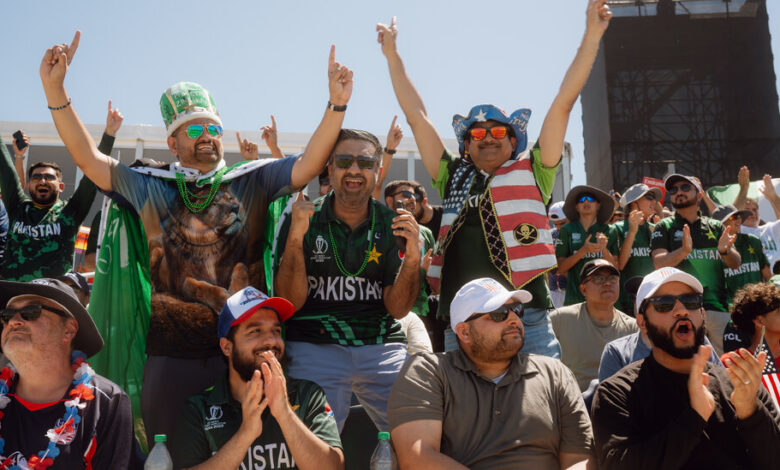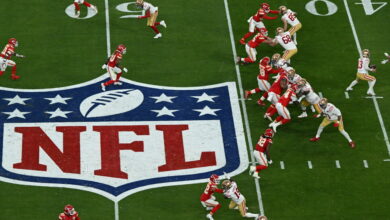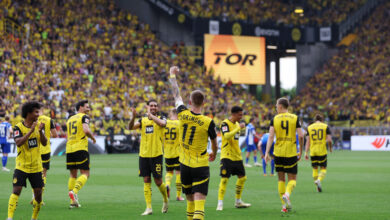Coming to a City Near You: A Cricket Stadium?

Four years ago, after officials in Grand Prairie, Texas, were pitched an idea to turn the city’s underused minor league ballpark into a stadium for cricket, the city’s manager, Bill Hills, thumbed through a copy of “Cricket for Dummies.”
Like most Americans, Mr. Hills was oblivious to cricket, although that is starting to change.
Last year, the 7,200-seat stadium in Grand Prairie became the new home of the Texas Super Kings, one of six teams that played in the inaugural season of Major League Cricket. And last week, the venue hosted the U.S. national team’s biggest-ever win, a stunning upset of Pakistan in the Men’s T20 World Cup, which this year is being jointly hosted by the United States and several Caribbean nations, and concludes on June 29.
A few days later, more than 34,000 cricket fans watched India narrowly beat Pakistan at a temporary stadium built in Long Island. When Los Angeles hosts the 2028 Summer Olympics, cricket will be among the new sports being played.
Cricket, the world’s second most popular sport, is having a moment in the United States, and investors are looking to cash in on a growing audience for the sport, especially among the cricket-loving South Asian diaspora. That includes backers of Major League Cricket franchises hatching plans for dedicated cricket stadiums in their own cities. The San Francisco Unicorns, the Los Angeles Knight Riders and the Seattle Orcas (partly owned by Satya Nadella, the chief executive of Microsoft) are negotiating leases and approvals to build new venues, with hopes of opening in the next few years.
Mr. Hills said that the Major League Cricket games last season in Grand Prairie “definitely exceeded our expectations.” During the two-week season and postseason, some 50,000 people attended a dozen matches in Grand Prairie, and the playoffs from July 27 to July 30 generated $1.7 million in economic activity, including retail, entertainment, car rentals, hotels and dining. The league’s next season starts in July, with Grand Prairie hosting 16 matches. Mr. Hills expects 85,000 fans will show up for the games.
“Who would have thought,” Mr. Hills said, that “a city like Grand Prairie would host international sporting events” watched by millions around the world.
“This makes Grand Prairie a destination, not just a little town between Dallas and Fort Worth,” he said.
Major League Cricket’s priorities include building more 7,000- to 10,000-seat stadiums near vibrant areas that could later blossom into entertainment districts. The stadiums will be used as playing fields to nurture young talent and appreciation for the game, said Will Swann, the league’s vice president of corporate development and infrastructure.
David Demarest, who leads the sports and entertainment development group at the real estate brokerage JLL, said cricket stadiums offered “a great opportunity to have an anchor that’s attracting people.”
“These are facilities you can program beyond cricket games,” he said.
The Seattle Orcas plan to build a stadium at Marymoor Park in Redmond, Wash., near a thriving downtown shaped by the Microsoft campus and the city of Bellevue. The Los Angeles Knight Riders have scouted a spot at the Great Park in Irvine, Calif., a wealthy part of Orange County. The San Francisco Unicorns have proposed building a stadium in the Santa Clara County Fairgrounds, a redevelopment site near Silicon Valley, and have worked with Devcon, the firm behind the San Francisco 49ers stadium, on schematics.
The proposed site for the San Francisco team offers development potential and a demographic draw. Studies by the team suggest that a wealthy community of roughly 250,000 people originally from India or elsewhere in South Asia live in the Greater Bay Area, said David White, the team’s general manager. The Santa Clara site hopes to attract multiple sporting venues, including a Major League Soccer stadium, to become a hub for sports and entertainment.
Those developments would need to be built with fans from South Asia and other areas where cricket is popular in mind, said Justin Geale, Major League Cricket’s tournament director.
“We’ll have samosas, and we’ll also have hot dogs,” he said. “We can bring the best of American sports and the best of cricket and meld them together.”
Cricket-focused developments are also taking place outside the league: In Oswego, Ill., a suburb west of Chicago, Paresh Patel, an entrepreneur, received approval to develop Breybourne Stadium, which will include a 25,000-seat venue as well as a 120-room hotel, restaurant and upscale clubhouse for special events. Set to break ground this summer, the stadium will have more seating capacity than the United Center, home of the N.B.A.’s Chicago Bulls and the N.H.L.’s Chicago Blackhawks.
Baseball evolved from cricket, where two teams face off on a larger, circular pitch and — to simplify it greatly — take turns batting and bowling in hopes of scoring the most runs. Once a popular American pastime, cricket was overtaken by baseball in the late 19th century. At its peak, thousands of cricket clubs operated across the nation, participating in what The New York Times described in an 1853 dispatch as a “manly and athletic sport.”
For purists, the highest form of the game is the so-called Test match, which can last up to five days. But a newer, more action-packed playing format, Twenty20, has grown rapidly in popularity. These games can be played in three hours, appealing to broadcasters and modern attention spans. The Indian Premier League, which is among the world’s most valuable sports properties, uses this format, as does Major League Cricket in the United States. (Many of the teams in the U.S. league share owners with Indian franchises.)
Major League Cricket is often compared with Major League Soccer, the U.S. league that started nearly 30 years ago and now features many custom soccer stadiums amid mixed-use urban developments, with enough pull to attract global stars. The relatively short Major League Cricket season runs in between other global cricket leagues’ schedules, allowing many of the sport’s top players, including the Australian stars Steve Smith, Pat Cummins and Glenn Maxwell, to play in the U.S. league. Think of it as if David Beckham and Lionel Messi played in the inaugural season of Major League Soccer instead of long after the league had established itself.
Still, cricket in the United States is a long way from having the popularity and investment needed to support major stadiums like Lord’s Cricket Ground in London, Eden Gardens in India, or the Melbourne Cricket Ground in Australia.
“The only reason cricket isn’t being played at the highest levels of competitiveness is that there’s no infrastructure in this country,” said Vijay Srinivasan, a Bay Area-based entrepreneur who founded Willow, a pay TV channel for cricket matches that grew from a small streaming site to a cable channel that reaches four million U.S. households.



